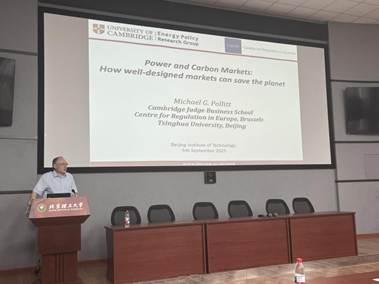
On the morning of September 5, 2025, Professor Michael Pollitt from the University of Cambridge was invited to visit the Center for Energy and Environmental Policy Research (CEEP), Beijing Institute of Technology (BIT), where he delivered an academic lecture titled “Power and Carbon Markets: How well-designed markets can save the planet.” The lecture was chaired by Professor Wang Ke and attended by faculty members and students of the center.
In his talk, Professor Pollitt examined how well-designed market mechanisms can support deep decarbonization of the economy. He introduced ways to achieve effective coordination between carbon markets and electricity markets through scientific design. Drawing on the European Single Electricity Market and the European Union Emissions Trading System (EU ETS), he shared insights into practical experiences regarding price linkages, regulatory coordination, and responses to energy crises, highlighting both innovative approaches and challenges encountered. These experiences, he noted, hold significant reference value for China, as the country advances electricity market reform and gradually expands its national carbon market.
Professor Pollitt is a Professor of Business Economics at the Cambridge Judge Business School. He serves on the editorial boards of leading international journals, including The Energy Journal, Energy Economics, Review of Industrial Organization, Energy and Climate Change, Economics of Energy and Environmental Policy, and Utilities Policy. He is Honorary Academic Co-Director at the Centre on Regulation in Europe (CERRE), Research Associate at the MIT Center for Energy and Environmental Policy Research, and Research Associate at the Public Policy Institute of the Colorado School of Mines.
Professor Pollitt has provided consultancy services for the UK Competition Commission, the New Zealand Commerce Commission, the World Bank, and the European Commission. He served as Vice President of the International Association for Energy Economics (IAEE) from 2020 to 2023. He is currently Assistant Director of the Energy Policy Research Group (EPRG) at Cambridge University and a member of the Cambridge Energy Interdisciplinary Research Centre.
